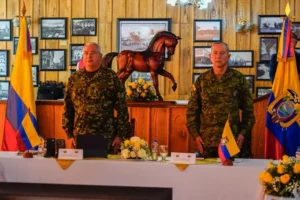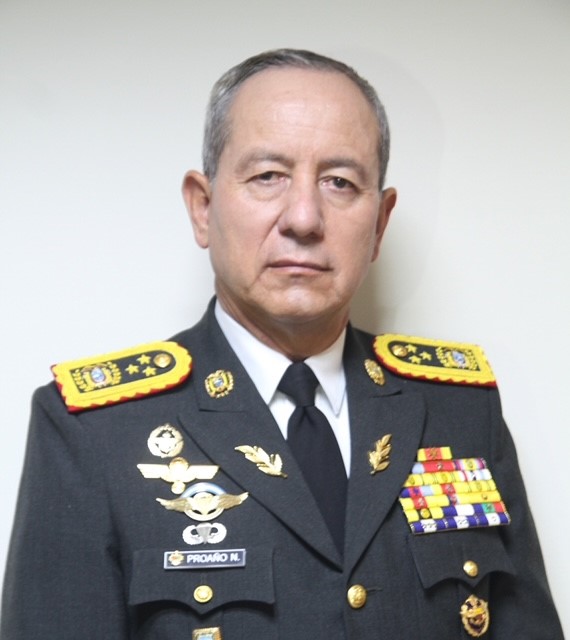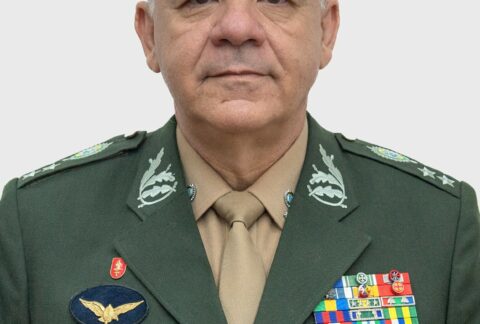Drug trafficking is one of the greatest threats to Ecuador’s national security. To combat it, Ecuadorian Army Major General Nelson Proaño Rodríguez, head of the Armed Forces ‘Joint Command, designs strategies and carries out coordinated actions to confront crime.
Maj. Gen. Proaño spoke with Diálogo about drug trafficking and the state of emergency by Executive Decree 823 of July 24, 2023, among other topics.
Diálogo: Drug trafficking is one of the greatest threats to Ecuador’s national security. How do the Armed Forces, together with the National Police, coordinate actions to neutralize it?
Army Major General Nelson Proaño Rodríguez, head of the Ecuadorian Armed Forces’ Joint Command: The State Public Security Council identified drug trafficking as a threat in 2022. From that moment on, the Armed Forces took a more prominent role in the fight against drug trafficking and related crimes. The National Police makes its efforts to fight it, but since it has been identified as a national threat, the Armed Forces must support this fight. For this reason, we have integrated special teams to work with the National Police and formed units that are directly assigned to operate against terrorism. Our joint cooperation has yielded positive results because we have managed to disarm some organized crime groups, and logically it has had an impact on improving the security situation of the population. However, there is a lot of work to be done because the threats are ever-changing; we must have that innovative capability that allows us to seek new strategies to be able to continue confronting this scourge.
Diálogo: What are the results of the operations to control arms, ammunition, and explosives inside prisons, in compliance with Executive Decree No. 823 of the State of Emergency?
Maj. Gen. Proaño: Decree 823 of the State of Exception, which the President of the Republic Guillermo Lasso issued on July 24, 2023, declared a state of exception, due to serious internal commotion, in all prisons that are part of the Social Rehabilitation System for 60 days, which provides for the direct intervention of the Armed Forces. The decision was based on the request and recommendation made by the National Police and the National Service of Integral Attention to Adults Deprived of Liberty and Adolescent Offenders (SNAI), due to the crisis generated by the attacks between organized criminal groups in the penitentiary centers. Under these criteria, the Armed Forces have acted and worked in the organization, planning, and support to the National Police to reestablish and maintain order and internal control of detention centers, as well as internal and perimeter security of the centers, while guaranteeing the rights of persons deprived of liberty.
The Armed Forces’ Joint Command plans the operations, enters, and intervenes in these centers, finding a large number of weapons, which, when confiscated, will have an impact on the reduction of violence by eliminating the possibility of aggressive riots. We have intervened in several prisons where we have found a significant amount of small and large caliber weapons, handguns, long weapons, and a large amount of rounds of ammunition. In addition, we have found illicit substances and countless tools and materials used by the prisoners; all this has an impact on internal security of detention centers because there are riots and deaths not only of the inmates but also for those who take care and are responsible for the security of penitentiary centers. These operations have yielded excellent results, and we hope to continue maintaining these permanent controls and entering the centers to keep them free of illegal weapons.

Diálogo: Ecuador participated in exercise Sentinel Resolution and multinational UNITAS exercise, among others. What is the added value of participating in these exercises conducted by the United States with countries of the region?
Maj. Gen. Proaño: These exercises were planned under U.S. coordination and have allowed the different components of our Armed Forces, land, air, and naval, to prepare and train our military personnel in the different activities and operations that involve coordinated and joint operations with other countries. Our participation in these exercises allows us to raise the response capacity of our armed forces to confront different types of threats.
Diálogo: How does the recent cooperation agreement between Ecuador and the U.S. help in strengthening the capability of law enforcement and the judicial sector to combat transnational organized crime and strengthen the security of citizens and communities in Ecuador?
Maj. Gen. Proaño: The Joint Command presented the Strategies for Peace initiative, in coordination with the National Police, to the President of the Republic Guillermo Santiago Lasso Mendoza, the Minister of Defense Luis Lara Jaramillo, as well as to the Commander of U.S. Southern Command, General Laura Richardson, and U.S. Ambassador to Ecuador Michael Fitzpatrick, and other authorities. This cooperation strategy was approved to implement security and defense capability building projects. A Memorandum of Understanding (MOU) was signed to strengthen Ecuador’s defense sector capabilities and define shared objectives related to security cooperation. This MOU includes collaboration in technical matters, best practices, lessons learned, and equipment in four lines of effort: information exchange, capacity building, training, and acquisition of essential resources.
Diálogo: What progress has been made in the work of the Armed Forces to combat illegal, unreported, and unregulated (IUU) fishing, especially the Chinese-flagged vessels that cross the Atlantic to the Pacific toward the Galápagos?
Maj. Gen. Proaño: We have vessels to carry out surveillance and control to combat IUU fishing. Ecuador has an Exclusive Economic Zone (EEZ) of about 200 miles, which allows us to determine whether these vessels are inside or outside the EEZ, while also allowing us to determine whether these vessels have turned off their signals. The U.S. supports us with airplanes that have the capacity to determine and locate at sea foreign flagged vessels that are not acting within the law. This allows us to determine their location.
Diálogo: What new military border operations are the Ecuadorian and Colombian armed forces carrying out?
Maj. Proaño: We have held meetings to establish coordinated operations on the northern border of Ecuador and the southern border of Colombia that allow for an exchange of information and intelligence to determine the threats that exist in this area to carry out mirror operations, that is, operations with Ecuadorian military troops in our territory and Colombian military troops in their territory in the same area. This allows us to act in a coordinated manner so that those who are in illegal situations cannot cross the border and remain free in the event that only one force acts. Certain designated areas of interest have been determined, which have been established as having the highest incidence due to military intelligence, and we have worked in those areas, obtaining very important results for both countries, since it has been possible to strike at the criminal groups that operate in the area.
Diálogo: What are the results of the support operations against illegal mining?
Maj. Gen. Proaño: Illegal mining is a local and transnational problem with many negative impacts on the environment, the national economy, and state security, among others. Illegal mining not only refers to those people who commit the illegal act of searching for the mineral or minerals, but it is also associated with other types of crimes with organized criminal groups, such as smuggling, money laundering, prostitution, labor exploitation, etc. At the national level there is a Special Commission for the Control of Illegal Mining (CECMI) chaired by the Ministry of the Interior. The CECMI acts as a coordination center for illegal mining among several estates, where we participate, the Armed Forces and the National Police, among others.









